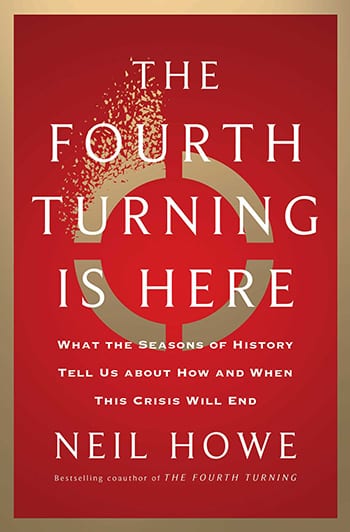While studying history back in the 1990s, Neil Howe and the late William Strauss noticed something: there seemed to be a pattern to history that repeated itself again and again. Howe and Strauss developed a theory that history moves in 80-100-year cycles divided into four 20-25-year "turnings": the High, Awakening, Unraveling, and Crisis. Neil Howe argues that we are currently living through a Fourth Turning, and today on the show, we unpack what that means. Neil is a historian, demographer, and economist, and his latest book is The Fourth Turning Is Here. The crisis of the Fourth Turning isn't a historical event — it's a generation-long era that sometimes seems to be getting better, sometimes seems to be getting worse, and moves through several phases before reaching a climax and resolution. Neil explains what these phases look like, which ones we've already been through and which are still to come, and when he thinks our Fourth Turning will end and the cycle of history will start over. In the second part of our conversation, Neil talks about what cultural changes he thinks we'll experience as the Fourth Turning progresses, including how he thinks gender roles will shift. We also discuss what happens if the crisis ends in disaster, and the most important thing to do to successfully navigate a Fourth Turning.
While studying history back in the 1990s, Neil Howe and the late William Strauss noticed something: there seemed to be a pattern to history that repeated itself again and again. Howe and Strauss developed a theory that history moves in 80-100-year cycles divided into four 20-25-year "turnings": the High, Awakening, Unraveling, and Crisis.
Neil Howe argues that we are currently living through a Fourth Turning, and today on the show, we unpack what that means. Neil is a historian, demographer, and economist, and his latest book is The Fourth Turning Is Here. The crisis of the Fourth Turning isn't a historical event — it's a generation-long era that sometimes seems to be getting better, sometimes seems to be getting worse, and moves through several phases before reaching a climax and resolution. Neil explains what these phases look like, which ones we've already been through and which are still to come, and when he thinks our Fourth Turning will end and the cycle of history will start over. In the second part of our conversation, Neil talks about what cultural changes he thinks we'll experience as the Fourth Turning progresses, including how he thinks gender roles will shift. We also discuss what happens if the crisis ends in disaster, and the most important thing to do to successfully navigate a Fourth Turning.
